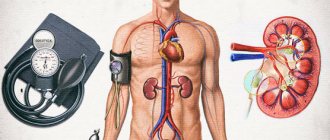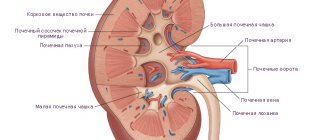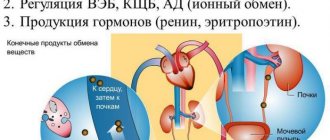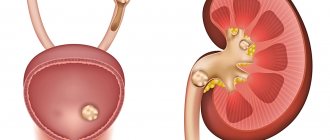Pyelonephritis is an inflammatory process that affects the tubular system of the kidneys. It is provoked by nonspecific infectious agents against the background of worsening urine outflow. People who regularly abuse alcohol suffer from various organ disorders, in addition, they have reduced immune abilities. Therefore, the development of pyelonephritis in an alcoholic is very likely.
The main function of the kidneys is to filter and remove all unnecessary, toxic, harmful substances from the body. Previously, doctors believed that regular consumption of alcohol in large doses reduces the functionality of the immune system, so infectious agents are activated and trigger inflammatory processes in various localizations, including the kidneys. That is, alcohol and pyelonephritis are not directly related; ethanol has only an indirect, indirect effect on the development of this inflammatory process.
This is true, however, in the light of recent research, this point of view has undergone changes; it turns out that ethanol and its metabolites have a direct effect on the development of pyelonephritis.
Ethyl alcohol, penetrating the body, decomposes under the influence of certain enzymes, and the primary product of its metabolism is a compound called acetaldehyde. This is an extremely toxic substance that harms the body much more than ethanol itself. Some of the acetaldehyde is converted into harmless substances, but if its amount is large enough, the body does not have time to produce enzymes to break it down. As a result, this toxin spreads to all organs and tissues, including the kidneys.
Getting into the kidneys and other organs, acetaldehyde is integrated into metabolic processes, disrupting their flow. A disorder of renal metabolism leads to the fact that the tubular system of the organ is blocked. The kidney is not able to fully remove toxins and waste compounds. The filtration function deteriorates, toxic substances begin to affect the tissues of the organ itself.
Under the influence of ethanol and its breakdown products, the exchange of calcium and phosphorus and purines is disrupted. These disorders lead to the development of various diseases, including urolithiasis, urolithiasis, gout, osteoporosis and pyelonephritis.
Alcohol also negatively affects the condition of vascular walls. Impaired blood supply to the kidneys due to vascular damage only aggravates the problem and accelerates the development of pyelonephritis, as well as its complications, in particular renal failure.
Why is kidney inflammation dangerous for alcoholics?
Pyelonephritis is a disease of an infectious nature, so the body is exposed to toxic waste products of pathogenic microorganisms. In addition, the filtration function is reduced, which further contributes to intoxication.
Clinically, this condition in acute pyelonephritis is manifested by the following symptoms:
- fever, chills and increased temperature, sometimes to high values (40 degrees or more);
- severe weakness, poor health, decreased vitality;
- dyspepsia, vomiting.
Acute intoxication of an alcohol-weakened body can lead to extremely serious consequences, including death.
Also, pyelonephritis is characterized by pain, often aching or dull, in the lumbar region, in the projection of the affected kidney.
With chronic alcoholism, people most often do not care about their own health and do not pay attention to alarming symptoms. In addition, ethanol has an anesthetic effect, so pain and discomfort remain practically unnoticeable for an alcoholic who regularly drinks alcohol.
Ignoring symptoms, lack of treatment, and continued alcohol abuse leads to a worsening of the disease and its transition to a chronic course.
The inflammatory process in the kidney becomes diffuse, spreading more and more, affecting the interstitial tissues of the organ. As a result, scar tissue remains at the site of inflammation, which significantly reduces the functionality of the organ. This is a vicious circle: toxins provoke the progression of pyelonephritis, and the inflammatory process increasingly worsens kidney function, promoting the accumulation of toxic substances.
Drinks that can be consumed if you have pyelonephritis
The development of pyelonephritis is a reason to stop drinking alcohol. With this disease, it is unacceptable to drink alcohol even in small doses. Drug treatment of pyelonephritis must necessarily be supplemented by adherence to a diet and a certain drinking regimen.
When there is an inflammatory process in the kidneys, strong tea and coffee are excluded from the diet, and strong broths are prohibited (with the exception of light vegetable broths).
Alcohol in acute pyelonephritis and in any outcome (recovery or transition to a chronic course) should be avoided.
With pyelonephritis, an increase in fluid intake is indicated. It is allowed to drink clean drinking water, fruit drinks, compotes, herbal infusions and teas, and natural juices.
What types of drinks are allowed for pyelonephritis?
You should understand: alcohol in any dose is harmful to the body, and kidney function in particular, it must be completely eliminated. Do not drink drinks with any percentage of alcohol. Patients are prescribed special diets that include large amounts of:
Herbal infusions are prescribed by the doctor and changed every two weeks, and in the first two days of treatment, weak sweet tea is prescribed. If there is no edema, then you can drink more than 2 liters of water per day, otherwise, reduce it to 2.
Fruits with a diuretic effect, such as watermelons, are eaten. Low-fat dairy products are also added to food.
But not all types of liquid can be drunk with pyelonephritis. Excluded from the diet:
- Fish, meat, mushroom and bean soups;
- Strong tea, coffee.
Pyelonephritis is a serious disorder, but treatable. In order for the recovery process to proceed without additional difficulties, you need to support the body’s resources: completely stop drinking alcohol and follow a strict diet.
Pyelonephritis is considered an infectious kidney disease, which is activated due to the entry of harmful bacteria against the background of poor urine output. Many people are interested in whether alcohol should be completely excluded in case of pyelonephritis or is a little allowed? Is drinking alcohol the cause of the disease, how can it affect the course?
Beer and pyelonephritis
If pyelonephritis is detected in a timely manner and treated, it is necessary to stop drinking any drinks containing ethanol. People with alcohol addiction, frightened by the prospect of disability or imminent death, but unable to cope with the pathological craving for alcohol, are looking for workarounds, trying to drink weaker drinks and believing that it is safe.
Many men also think the same, and in principle do not perceive beer as an alcoholic drink. However, both wine and beer are also strictly prohibited for pyelonephritis.
First of all, weak alcoholic drinks are no less dangerous, since they also contain ethanol, which destroys the kidneys already affected by the inflammatory process.
In addition, weak alcohol is quite easy to drink, and the effect from it is felt weaker, at least at first. It is already difficult for people with alcohol addiction to stop drinking alcohol, and when drinking weak drinks there is a chance to drink much more.
Contrary to popular belief, beer and other alcohol do not dissolve kidney stones or improve the filtering function of the kidneys, acting as a diuretic. The harm caused by ethanol to the body is much worse than all the potential benefits taken together (and it has not yet been scientifically proven that they are real). Therefore, if you have pyelonephritis, you should avoid drinking alcohol, especially if the disease is caused by alcohol addiction.
A serious chronic disease - pyelonephritis, requires a special diet in which there is no place for alcohol. This inflammatory disease is practically incurable, but with proper treatment and following all doctor’s recommendations, the patient can live a long life. To do this, you will have to give up alcohol-containing drinks forever and choose safer methods that will help you spend your leisure time pleasantly.
Pyelonephritis and alcohol are antagonists, and for any kidney disease you should stop drinking alcohol.
Contraindications
The treatment method for urethritis is selected individually for each patient. However, for his part, the patient must do everything possible to avoid relapse. Most bad habits will have to be abandoned. The correct diet will speed up the process of complete restoration of the functioning of the kidneys and circulatory system. In the new diet, a number of products are prohibited, namely:
- Any fried foods;
- Home canned food and marinade;
- Meat and fish of fatty varieties;
- Fatty fermented milk products, milk;
- Smoked and dry-cured sausage, frankfurters;
- Onions, horseradish and garlic;
- Spicy dishes, seasonings, sauces (especially mayonnaise and mustard).
Try to include as many vegetables and fruits, healthy low-fat protein (chicken, fish, kefir) in your menu. The diet should contain a minimum of salt, no more than 7 grams. in a day.
Alcohol
Everyone knows that alcohol destroys the human body. If a patient has inflammatory kidney disease, drinking alcohol is strictly prohibited. Such drinks upset the balance of vitamins in the body, weaken the immune system, and block the kidney ducts. Alcohol intoxication becomes stronger and more unpleasant with each new use of alcohol. If you get carried away with wine or vodka during pyelonephritis, the patient may experience kidney failure within a few months.
Is it allowed to drink beer if you have pyelonephritis? Many men consider this drink practically harmless, since it contains little alcohol. However, the opinion of doctors on this matter is categorical. Drinking any alcohol, including beer, is strictly prohibited. During the treatment of pyelonephritis, the patient, as a rule, takes potent antibacterial drugs that cannot be combined with alcohol.
Bathing
Doctors recommend that patients with inflammatory kidney disease limit water procedures. However, this does not mean that washing is prohibited. Replace a hot bath with a warm shower. Recommended water temperature is up to 36 degrees.
It is not recommended to visit a bathhouse or sauna if you have pyelonephritis. If you have such a desire, go only to a weakly heated steam room, where the temperature reaches a maximum of 37 degrees. Thermal procedures at high temperatures and inflammation are strictly prohibited.
There are also contraindications for visiting the pool. The patient may become hypothermic, which leads to relapse of the disease.
Intimacy
Is it possible to have sex with pyelonephritis? Intimacy is not prohibited, but in the acute phase of the disease the patient feels unwell and his sexual desire weakens. In order for sexual life to return to normal, it is important to identify the exact cause of the pathology and effectively eliminate it.
The disease is often caused by harmful microorganisms that are sexually transmitted.
To exclude relapse and re-infection, you need to ask your sexual partner to also undergo a comprehensive examination and submit blood and urine for laboratory testing. If both partners are sick, intimacy should be avoided until complete recovery. Share:
Can alcohol lead to pyelonephritis?
To understand how alcohol affects the patient’s body, you should know what it is. In medicine, this disease is interpreted as an inflammatory process in the renal pelvis, caused by various bacteria, but most often by E. coli. Based on this, it should be understood that the kidneys are a kind of filtration system of the human body that passes toxic substances through itself. With the help of the renal tubules and pelvis, toxins are filtered out and released through the pores. Alcohol, penetrating inside a person, contributes to the disruption of his defenses, so pathogens easily cause all sorts of ailments, including pyelonephritis.
The mechanism of the onset of the disease due to alcohol intake
In addition to the fact that ethyl reduces the body's defenses, it also disrupts metabolism, causes blockage of natural ducts in the renal pelvis and contributes to kidney dysfunction. As a result, necrotic changes form on the tissues of the renal tubules, and the inflammatory process is activated, which spreads more and more with each portion of alcohol taken. Impaired purine metabolism leads to the deposition of excess urea, the salts of which are localized in the renal tubules, causing pyelonephritis. The amount of sediment in urine increases even with the slightest dose of alcohol.
Can alcohol cause the development of pyelonephritis?
Pyelonephritis occurs as a result of an inflammatory process in the kidneys, which provokes the entry of pathogenic microorganisms into the human body. In the absence of proper hygiene, as well as a weakened immune system, the infection, once in the kidney cells, becomes more active. As a result, pyelonephritis occurs. There are several ways bacteria can enter the body:
- from the external environment (staphylococcus, streptococcus, E. coli);
- through the blood (oral infections, boils);
- from teeth (caries).
As you know, the kidneys are a very vulnerable organ to the effects of alcohol. Alcoholic drinks contain ethanol, a toxic substance that adversely affects the excretory and filtration functions of the kidneys and blocks the functioning of the renal tubules. They fail to cope with their main task of removing poisons, metabolic residues, and harmful breakdown products of medications from the body. Over time, kidney failure develops, and then pyelonephritis.
How can alcohol cause illness?
Drinking alcohol directly cannot provoke pyelonephritis, because for the disease to occur, an inflammatory process must occur in the body. Alcohol suppresses the immune system. Because of this, the infection has the opportunity to enter the liver cells and become active there. In addition, pyelonephritis is a disease that accompanies urolithiasis. Poor urine output, as its constant companion, provokes inflammation in the kidneys. Alcoholic drinks, including beer and wine, in addition to toxic effects, create a diuretic effect. Therefore, the kidneys have to perform their main functions of filtering and removing poisons when the body becomes dehydrated. Although many consider beer an effective means of removing sand and stones from the kidneys, it should not be abused. The stone will not come out, but the ureter may become blocked, which will only worsen the course of the disease and complicate subsequent treatment.
The danger of pyelonephritis in an alcoholic
Pyelonephritis is a dangerous infectious disease that, if treated incorrectly or untimely, can lead to death.
Often people suffering from alcohol addiction do not notice signs of intoxication, expressed in an increase in body temperature to 39 degrees or higher, dull pain in the lower back, weakness, “chill on the skin,” nausea, vomiting. They are often ignored. With reduced immunity and lack of basic hygiene, alcoholics have zero chance of a favorable recovery. The disease takes over increasingly large areas of the kidneys, they shrink, and scars appear. In this case, their normal functioning is impossible. There is an accumulation of toxic substances and general poisoning of the body. Therefore, you should drink wine, beer and other alcoholic drinks in limited quantities, because even their rare consumption can affect the condition of the kidneys and other organs, not to mention a hangover and swelling of the face in the morning.
How dangerous is pyelonephritis for a person with alcohol addiction?
Nonspecific kidney disease of bacterial origin can be fatal if not treated correctly. People with alcohol addiction often do not pay attention to the manifestations of intoxication, which is evidenced by high body temperature, dull pain in the lower back, severe weakness, nausea and vomiting. Meanwhile, the alcoholic rapidly develops pyelonephritis without any chance of recovery. Regular consumption of alcohol leads to the formation of scars on the kidneys, interfering with the normal functioning of the organ, and the accumulation of toxins that poison the human body. Therefore, beer, wine and other strong drinks with pyelonephritis can hasten the approach of death of the patient.
Lifestyle with kidney disease
The disease can recur due to hypothermia, so you should not overcool your legs or lower back. To prevent infection “from the outside” from entering the kidneys, it is not recommended to have contact with patients with tonsillitis or ARVI.
A person who has had kidney disease will have to limit physical activity. Walking and light exercise are recommended. You can do any homework. But working, for example, as a loader, is not recommended.
Pyelonephritis is a serious but curable disease. However, you can completely get rid of it only by leading a healthy and sober lifestyle, carefully following all the recommendations of doctors.
Thank you for your feedback
Features of therapy
Treatment of pyelonephritis consists of eliminating the causes that complicate the course of the disease and maintaining the patient’s normal condition. There are several methods that can help cope with pyelonephritis:
- Taking antibacterial drugs. The patient is prescribed antibiotics that are sensitive to bacteria that provoke an inflammatory process in the renal pelvis. Antibiotics must have a broad spectrum of action and be excreted through urination in order to ensure a high concentration of drugs directly in the kidneys. Usually prescribed to drink "Furadonin", "Ceftriaxone", "5-NOK". It is important to know that while taking antibiotics, drinking alcohol is out of the question.
- Use of alternative medicine. Natural medicines offered by traditional healers not only improve the condition of the kidneys, but also have a beneficial effect on the human body as a whole.
- Detoxification therapy and elimination of the root cause of pyelonephritis. To remove toxic substances that affect the renal pelvis, it is recommended to drink as much fluid as possible. To normalize the outflow of urine, disturbances of which contribute to the appearance of pyelonephritis, antispasmodics are prescribed.
- Proper nutrition and lifestyle. The basis of treatment for pyelonephritis is a special diet, which involves minimal protein consumption and reducing the load on the kidneys. It is extremely important to stop drinking strong drinks, since even a minimal amount of alcohol can provoke an exacerbation of pyelonephritis.
In order for the treatment to be as beneficial as possible, the patient should strictly adhere to all prescriptions and recommendations of the attending physician.
Pyelonephritis is a kidney disease caused by bacterial inflammation and impaired urine flow. In people who drink alcohol, the normal functioning of all internal organs is disrupted; they are overloaded with the toxic effects of ethanol. The kidneys, which perform the filtration function in the body, take a big hit, removing the breakdown products of alcohol from the body. The combination of pyelonephritis and alcohol, in any form, is especially dangerous.
From the first glass to pyelonephritis
What happens in the body of an alcoholic? How are the kidneys affected? Medicine has been searching for an answer to this question for many years. Today it is reliably known that even a single dose of alcohol can lead to pyelonephritis or other kidney diseases. How does this happen?
It is known that drinking alcohol not only disrupts the normal functioning of organs, but also lowers immunity and has a depressing effect on the psyche. A person ceases to be interested in his health and often misses the first symptoms of the disease. A chronic drunkard rarely takes care of himself or maintains hygiene. This is another reason for the development of pyelonephritis, because there are many reasons for the occurrence of this disease, including:
- External exogenous infection that enters the body from the external environment. Pyelonephritis can develop due to the ingestion of E. coli, staphylococci or streptococci, and fungi. Usually all of them are present where there is no proper hygiene. And its absence is often accompanied by alcoholism.
- Microorganisms can enter the kidney through the blood. This often happens in those suffering from constant colds, ENT diseases, furunculosis, etc. To damage the kidney, it is enough for these pathogens to enter the organ when the blood circulation in the kidney is impaired and the outflow of urine is reduced. Both happen all the time in people who drink alcohol regularly.
- Another way of occurrence of pyelonephritis is infection in the kidneys from teeth affected by caries. Bacteria that destroy the tooth “sink” into the kidneys. A weakened immune system is unable to cope with the threat. An inflammatory process begins, which experts call nonspecific. The kidney tubules are affected and pyelonephritis flares up.
Effect of alcohol on the kidneys
Today, medicine knows that regular consumption of alcohol leads to serious diseases, including kidney diseases. Alcohol, drunk only once, under conditions favorable for the development of the disease, can cause irreparable harm to the kidneys.
Those people who have already suffered severe inflammatory kidney disease need to be especially careful about what they ingest. One thing is clear: after pyelonephritis, it is better to completely remove alcohol from your lifestyle as a drink. After all, under its influence, immunity decreases, the functioning of internal organs and the psyche is disrupted, and this is dangerous due to relapses of inflammation. All this can lead to kidney failure.
Bacteria can enter the human body in different ways:
If previously it was believed that alcohol, by reducing immunity, promotes the growth of the number of microorganisms, thereby contributing to the occurrence of pyelonephritis, today the harmful effect of even the smallest amount of alcohol on kidney function has been reliably proven. And these are the most favorable circumstances for the development of severe kidney diseases of any nature, including kidney failure.
Ethanol contained in alcoholic beverages in minimal quantities reduces the filtration and excretory function of the kidneys. In particular, the renal glomeruli and tubules are affected. Under strong pressure, blood flows through the glomeruli. In this way, harmful substances that can dissolve in water are removed from the body (for example, poisons, various compounds, products of metabolism and processing of drugs, etc.). And due to the fact that alcohol changes the metabolism in the body at all levels, the tubules are blocked (due to changes in lipid, purine and phosphorus-calcium metabolism).
With regular alcohol consumption, the kidneys gradually reduce their function, until the organs completely stop and tubular necrosis develops. The tubular cells, dying, are not able to remove toxic substances from the body, causing even greater disruption of metabolic processes. As a result, pyelonephritis develops.
Impaired purine metabolism leads to the development of gout (this is especially noticeable in alcoholics). Small doses of alcohol leave sediment in the urine. And impaired phosphorus-calcium metabolism demineralizes bone tissue, leaching substances from it. As a result of these reactions, substances washed out of the bones settle in the kidneys, forming stones.
Ethyl alcohol has a detrimental effect on the vascular system of the kidneys and the entire body as a whole, leading to sclerosis. Poor circulation in these organs causes chronic nephritis and pyelonephritis. If you do not remove alcohol from your lifestyle and do not begin adequate treatment, pyelonephritis gradually leads to kidney failure and irreversible changes in organs (large white kidneys).
Now it is fashionable to talk about the regular consumption of wine or beer and their benefits for the body. Despite the propaganda of these aromatic drinks, we can firmly say that they are harmful in any quantity to the kidneys, and in case of pyelonephritis in particular. No type of alcohol, including wine and beer, is a medicine. Today, the harm of alcohol on all systems and organs of the human body has been reliably proven. And people with a tendency to kidney diseases may develop toxic necronephrosis and other serious diseases, including those incompatible with life.
Is it possible to drink alcohol (beer) with pyelonephritis?
Alcohol abuse negatively affects the functioning of all body systems. The liver and kidneys, which act as a filter and neutralize toxins, suffer greatly from addiction to drinking. If the patient has inflammatory diseases of these organs, then it is better for him to completely abstain from alcohol. The combination of pyelonephritis and alcohol can lead to the most severe consequences, including acute renal failure.
Read in the article
Kidney inflammation or pyelonephritis
When an infection enters the kidneys, inflammation of their individual parts, for example, the pelvis and parenchyma, develops. This is a very dangerous disease, which is complicated by impaired fluid outflow and the proliferation of pathological microflora, and is called pyelonephritis. The main factor in its development is infection from the external environment or from the body itself. This is possible with decreased immunity, hypothermia and the presence of chronic diseases.
The danger of pyelonephritis and its symptoms
In the case of regular alcohol consumption, each new exacerbation of pyelonephritis leads to total inflammation of all kidney tissues. Gradually, the inflamed tissue degenerates into scar tissue, which “tightens” the kidney. The kidney stops working and is no longer able to remove waste products, the accumulation of which leads to severe intoxication of the entire body. If this happens, then hemodialysis (the so-called “artificial kidney”) is performed, which cleanses the blood. This prolongs life for some time. And, if you do not stop drinking alcohol, death is inevitable.
The most common symptoms of pyelonephritis:
- Painful sensations (dull or cutting) in the lumbar region, which can be felt in the groin, genitals, and on the anterior wall of the peritoneum;
- High body temperature (up to 39-40 degrees), especially in the evenings;
- A sharp deterioration in general health, weakness;
- Nausea, vomiting;
- Decreased or complete absence of appetite;
- Changes in the quality of urine (unpleasant odor, unusual color, turbidity);
- Change in the amount of urine excreted (copious or scanty).
Attention! If at least one of the listed symptoms occurs, you should immediately consult a doctor!
Consequences of drinking alcohol
Doctors, when asked whether it is possible to drink alcoholic beverages with cystitis, answer unequivocally - no. An imaginary improvement in well-being is created due to the dulling effect of surrogates that dilate blood vessels. But at the next stage of the hangover, the symptoms of cystitis return with a vengeance. Why? The body at this time:
- dehydrated and lacking fluids;
- the kidneys and liver try to cope with poisons (if a lot of alcohol has been drunk, then toxic substances enter the blood);
- the muscle fibers of the swollen and irritated bladder and urethra spasm;
- actively reproducing pathogenic microorganisms increase inflammation, which can spread to other internal organs along the ascending path (usually the kidneys);
- the amount of urine produced decreases sharply (it becomes thicker and darker);
- laboratory analysis reveals a huge number of leukocytes in the excreted fluid, and signs of hematuria (admixture of blood) may appear.
Treatment of cystitis is complicated by the fact that after drinking alcohol, the body’s defenses are weakened, and at this time its capabilities are aimed at removing residual alcohol products, and not at fighting inflammation.
Treatment of kidney inflammation
For those who drink alcohol with pyelonephritis, there is no specific treatment. Therapy is carried out according to the same scheme as for all other people. However, it is first necessary to remove the person from the state of alcohol poisoning, and then begin to treat kidney inflammation.
In any case, after alcohol poisoning is removed, the cause of the disease is first identified. Antibacterial therapy that relieves inflammation is carried out only with complete abstinence from alcohol. Otherwise, the treatment is reduced to zero and is aggravated by even greater side effects.
Note! Untreated pyelonephritis leads to pathogenic microorganisms becoming more resistant to antibiotics. Thus, if a relapse occurs, more expensive therapy that can cure the kidney disease will have to be used.
Drinking alcohol against the background of pyelonephritis
In itself, the presence of pyelonephritis in a person is characterized by the presence of a constant problem in the form of inflammatory processes. From foci in the kidneys, bacteria and their waste products spread into the collecting system, and through the ureters into the bladder cavity itself.
Through the circulatory system, the process affects other human organs and systems. Metabolites constantly circulate in the blood, penetrating into unaffected tissues, such as the liver, pancreas and even the brain. Accordingly, intoxication does not decrease, and the reserves of the body’s defense systems are inevitably depleted. The kidneys cannot effectively fight foreign elements.
Pyelonephritis and alcohol are a deadly combination. If you have kidney disease, constant drinking of alcohol greatly increases the likelihood of death. This is due to two parallel processes.
- The first action is based on a dysfunction of the organ. The progression of pyelonephritis leads to the formation of new zones of fibrosis until the working parenchyma in the kidney is replaced by scar tissue. Under the influence of alcoholism, the kidney structure cannot recover between episodes of exacerbation of the disease. Areas of edema and scarring continue to occupy increasing volumes of the organ. Sclerotic processes lead to atrophy of the kidney tissue, which is no longer able to fulfill its purpose (filtration, removal of decay products).
- The second process is the effect of alcohol itself. As stated earlier, alcohol disrupts blood microcirculation due to atherosclerosis. The combination of the sclerosing effect of alcohols and progressive inflammation leads the body to toxic poisoning.
It is not possible to cure a necrotically damaged kidney. The only solution is extrarenal blood purification using hemodialysis, which can prolong life. But if the patient neglects the recommendations and continues to drink, then the effectiveness of the treatment will not only decrease, but will have no meaning.
Blood purification using hemodialysis
The treatment tactics for the disease involve the complete exclusion of alcoholic beverages, otherwise all medications will not be able to have a therapeutic effect. For example, antibiotics are considered first-line drugs. But they can only fulfill their task if the patient does not drink alcohol.
Nutrition for pyelonephritis
The first requirement for a patient with pyelonephritis will be absolute sobriety, as well as adherence to a special diet. First, drink plenty of fluids and eat a fruit and vegetable diet for several days. It is good to drink freshly squeezed non-acidic juices, clean water, weak tea, herbal infusions, fruit drinks, compotes, eat zucchini, watermelons, strawberries and other fruits and vegetables that have a diuretic effect. Reduce protein intake.
After the acute attack is relieved, fermented milk products (cottage cheese) and easily digestible steamed foods are added to the diet. Limit salt intake (up to 1.5-2 g/day). Strongly spicy, smoked and salty foods, as well as fried and canned foods are removed from the diet.
Note! For pyelonephritis, it is very useful to drink herbal infusions. Your doctor will tell you which herbs are suitable for your case.
What to drink and eat with pyelonephritis
In addition to avoiding alcohol, pyelonephritis requires a special diet. Its goal is to eliminate the increased load on the kidneys and minimize harmful substances entering the body. First of all, doctors recommend eliminating or minimizing salt and protein intake. The basis of the diet should be easily digestible foods with low calorie content. You cannot eat canned food, spicy seasonings, fatty soups, or drink coffee. Drinking tea from medicinal herbs is allowed. Fried, salted, pickled, smoked foods should be excluded.
Lifestyle with kidney inflammation
Pyelonephritis can occur due to hypothermia. This is especially true for the chronic form of the disease. Therefore, you need to protect your legs and lower back from the cold. Even if you just have a cold, a common ARVI or sore throat can cause acute inflammation of the kidneys.
Those who have had kidney inflammation should limit intense physical activity. Recommended:
- physiotherapy;
- hiking over rough terrain;
- housework (except weight lifting);
- active games in the fresh air.
A bath or sauna can help improve kidney function by helping blood flow and reducing symptoms. In the bathhouse, drinking alcohol is contraindicated, but drinking plenty of water is encouraged. Heat promotes intense sweating and the removal of toxins through the skin, thereby taking over some of the functions of the kidneys.
Alcohol for pyelonephritis is strictly prohibited, since ethanol further disrupts the functioning of already weakened organs. Moreover, excessive drinking of alcohol can lead to the disease itself. According to statistics, kidney inflammation occurs several times more often in alcoholics than in people who do not abuse alcohol.
Pyelonephritis is a serious kidney disorder of bacterial origin. It has now been revealed that this disease develops in the presence of two factors:
- inflammation of a bacterial species in the kidneys;
- weak urine flow.
For alcoholics, these two conditions are fully met. And besides, such people are much less interested in the state of their health and do not pay attention to the symptoms of the disorder. As a result, inflammation can reach the final stage, when it will be almost impossible to help the patient.
Causative agents of pyelonephritis:
- coli;
- staphylococcus;
- streptococcus;
- fungal microorganisms.
E. coli
Very often such pathogens can be found in dirty rooms. And since alcoholics often do not take care of themselves and do not maintain hygiene, they are more susceptible to infection than ordinary people.
Patients addicted to alcohol quite often exhibit impaired microcirculation of the blood flow along with impaired urine outflow. Due to kidney dysfunction, microbes can easily enter the organ.
Microorganisms can also enter the kidney through the bloodstream. This is often observed in people with constant:
- colds;
- ENT pathologies;
- furunculosis, which occurs due to deterioration of the immune system associated with alcohol consumption.
Also, one of the reasons for the progression of pyelonephritis is caries. Bacteria that destroy teeth subsequently often enter the kidneys. A weakened immune system is unable to resist the threat.
For quite a long time, medicine was confident that alcohol affects the development of pyelonephritis not directly, but indirectly, impairing the ability of the immune system to fight infections. However, in our time, it has been reliably proven that even a minimal amount of ethanol, when ingested, helps to reduce the efficiency of the excretory activity of the kidneys, resulting in the creation of the most favorable environment for the manifestation and progression of pyelonephritis. The puffy faces of people with alcoholism are proof of this.
Drinking alcohol during pyelonephritis: is it possible?
Infectious and inflammatory kidney disease with damage to the interstitium and pyelocaliceal system is called pyelonephritis.
It occurs as a result of the penetration of pathogenic microbes into this area, which cause a pronounced inflammatory reaction and intoxication of the body.
The pathology often occurs in people with reduced immunity and a tendency to form kidney stones.
Due to the prevalence of the disease, people often ask: is it possible to drink alcohol while developing pyelonephritis?
A little about the disease
Pathological damage in the kidneys is infectious in nature. Even when the urinary tract is blocked by stones, conditions are created for the rapid and favorable growth of bacteria.
As a result, inflammation occurs, which brings severe discomfort to the patient.
Infection enters the kidneys in three ways. Highlight:
- Hematogenous spread, in which bacteria enter the bloodstream.
- The lymphogenous path is similar to the first one, only the drift occurs with the flow of lymph.
- Ascending or urogenic. It is characterized by the spread of bacteria from bottom to top, progressively affecting the urethra, then the bladder and kidneys.
It is important to remember that such a spread of pathogenic flora is only possible against the background of reduced immunity. In addition to the causes, risk factors are identified in the pathogenesis of the disease. This group includes those conditions against which the body’s immune status weakens.
Alcohol is one of these risk factors, since constant use affects the functioning of systems and organs. This group includes:
- Concomitant diseases of a chronic nature.
- The presence of foci of infection in the body. These include tonsillitis, sinusitis, gastritis.
- Bad habits such as smoking.
- Excess body weight, sedentary lifestyle, poor nutrition.
Often pyelonephritis occurs against the background of several factors. It is important to remember about the presence of a genetic predisposition, which becomes a decisive link.
The role of alcohol
Alcoholic drinks had a negative effect on the functioning of the kidney filter and the body. Constant use affects the normal functioning of the immune system, the functioning of the gastrointestinal tract, and the heart.
The effect of ethanol on the body depends on the duration of use, the quantity and type of the drink itself.
Considering the issue of drinking alcohol against the background of pyelonephritis, pay attention to the kidneys and immune system.
If the patient takes ethanol, the following develops in the body:
- The excretory function of the organ suffers, and the processes of normal fluid outflow are disrupted. For this reason, after drinking ethanol, the face becomes swollen or puffy.
- Changes are observed in the functioning of the tubules and glomeruli, which over time causes the development of sclerosis and a decrease in filtration capacity.
- Disturbances are observed in phosphorus-calcium metabolism, which is accompanied by an increased risk of developing stones.
Pyelonephritis and alcohol intake are two incompatible phenomena. Alcohol reduces the chance of effective treatment and increases the risk of relapse.
Drinks containing ethanol aggravate the course of the disease and make a significant contribution to the development of the disease.
Even one-time use is unacceptable if there is damage to the urinary system. If you take alcohol during treatment, it provokes:
- Penetration of infection into the bloodstream with the development of sepsis. According to statistics, such a complication ends in death in 70% of cases.
- The development of shock, in which the outcome will depend on the speed and volume of treatment.
By taking ethanol, the patient dooms himself in advance to a negative prognosis in terms of the course of the disease and recovery.
Pyelonephritis and alcoholism
Attention in this matter is given to the constant intake of ethanol. Alcoholism reduces the body's defenses. A person in this state is constantly exposed to the development of infectious diseases.
A decrease in immunity with constant use of ethanol occurs for the following reasons:
- Liver damage, and as a consequence the development of chronic inflammation. Irreversible disruption of the organ affects the general condition. Metabolic products are not disinfected in the body.
- Disorders of the gastrointestinal tract. Due to constant dyspeptic disorders, changes appear in the intestinal microflora.
- Effects on the central nervous system. It becomes the cause of inappropriate behavior and an antisocial lifestyle, which is associated with the development of secondary immunodeficiencies.
It is not recommended to drink alcohol during pyelonephritis, even in minimal concentrations. Taking ethanol during treatment with tablets increases the risk of developing a chronic form or a number of complications that are dangerous to health.
Video
Effects of alcohol on the urinary system
The kidneys in the body have a filtering function, and it is performed by the glomeruli and tubules. Blood flowing under high pressure through the glomeruli helps remove from the body all water-soluble elements that negatively affect health:
- toxic substances;
- exchange balances;
- various compounds accumulated from medications.
Alcohol significantly impairs metabolism at every stage. The transformation of purine, phosphorus-calcium, and lipid metabolic processes negatively affects the tubules, clogging them.
Kidney function deteriorates, and insufficiency of the same name is formed, which after some time transforms into tubular necrosis. It has been proven that alcoholic drinks, even in small dosages (wine, beer), significantly worsen the filtering ability of the kidneys.
- The death of tubular cells contributes to the accumulation of toxic elements.
- Metabolism is noticeably deformed, provoking the development of chain reactions in the body, which ultimately comes down to the manifestation of the disorder.
- Interruptions in purine metabolism provoke the formation of gout. In patients who drink, this disease progresses more rapidly, because even critically small doses of alcohol are deposited in the urine.
- The transformation of phosphorus-calcium interaction washes these elements out of bone tissue, and their demineralization occurs. A number of substances separated from the bone structure are deposited in the kidneys in the form of stones.
Ethyl alcohol damages the vascular network, which further interferes with the normal functioning of the kidneys, leading to their sclerosis, which, in turn, is a direct cause of the development of pathologies such as chronic nephritis and pyelonephritis.
Even if pyelonephritis is diagnosed at an early stage and treated, alcohol should not be consumed after that.
After the elimination of inflammation, traces in the form of microscars remain on the kidneys, the kidney itself seems to shrink and foci of necrosis can be seen. At any subsequent ultrasound, the physician will diagnose by the appearance of the kidney that there was a manifestation of pyelonephritis in the past.
The effects of alcohol on the kidneys
Can you drink alcohol if you have kidney disease? As already mentioned, it leads to deformation, which prevents the filtering of harmful substances. Each subsequent use causes new inflammatory processes.
Consequences of alcohol:
- Causes toxic poisoning;
- Damages the vascular network;
- Significantly slows down metabolism at each stage;
- Worsens purine, lipid and phosphorus-calcium metabolism;
- Blocks the ducts.
- Immunity decreases;
- Loss of appetite;
- Kidney failure appears;
- Purine metabolism is disrupted: gout forms;
- Degeneration of tissues, formation of large white buds;
- Possible death.
Consequences
The consequence of pyelonephritis can be fatal, especially in patients who are addicted to alcohol-containing products. Each subsequent exacerbation can provoke inflammation of even more kidney tissue.
As a result, the affected tissue turns into scar tissue. These formations provoke contraction of the kidney, it shrinks and its ability to remove decay products atrophies.
Toxic masses gradually accumulate, and at a critical volume the entire body is poisoned. For some time, their elimination is facilitated by hemodialysis, i.e. artificial purification of blood fluid. This procedure, best known as an artificial kidney, helps maintain vital functions for a period of time. However, there are a number of difficulties here:
- To qualify for hemodialysis, periodic treatment is required. Not every alcoholic regularly visits his doctor.
- Even carrying out the presented event cannot guarantee the preservation of life if the patient does not eliminate alcohol from his life.
Hemodialysis machine
There is no special treatment for pyelonephritis for alcoholics. They receive care on the same basis as all other patients. Often attacks of pyelonephritis occur during binge drinking, therefore, before starting treatment, procedures are carried out with the hospitalized person to eliminate the cause, namely, to remove the patient from the pathological state.
Some patients believe that the attack and its symptoms can be relieved by taking a large number of antibiotics. One such opinion is erroneous. Antibiotics cannot eliminate the very cause of the disease. And the risk of a new attack in the patient is very high. Moreover, surviving bacteria will become more resistant to medications, leading to several times longer treatment duration.
People who have previously suffered from severe inflammatory kidney pathology need to be especially careful about their diet. It is best to completely eliminate alcohol for pyelonephritis, including non-alcoholic beer. If you do not follow this advice, an acute attack of the disease will appear.
The only thing allowed during the remission stage is visiting the bathhouse.
Pyelonephritis
- an inflammatory process that affects the tubular systems in the kidneys. The cause of the disease is of a bacterial nature, characterized by pathology of the renal pelvis, calyces and interstitial tissue of the kidney parenchyma.
To activate the pathology, bacterial inflammation must occur and conditions for insufficient urine outflow must be created. In patients who are alcohol dependent, both of these factors occur.
Drinking strong drinks interferes with the optimal functioning of organs, reduces immunity, and adversely affects the psyche. A person who abuses alcohol is extremely careless about his health and may well not pay attention to the first signs of illness. Hygiene procedures are also not among his mandatory activities.
Pyelonephritis develops as a result of infectious infection. The causative agents of inflammatory pathology in the kidney are Pseudomonas aeruginosa, Proteus, Escherichia coli enterococci, and staphylococci. Penetration of bacteria into the kidney occurs through its transfer by blood from any infected area in the body, for example, with colds, caries, ENT diseases, furunculosis. Inflammatory agents can also enter the kidney from the urinary tract along the wall of the ureter.
The infection invades the kidney cells. To activate pyelonephritis, it is enough that the immune system is suppressed and urine output is weakened.
What happens if you drink alcohol with pyelonephritis?
Pyelonephritis is a nonspecific inflammation of the kidneys that affects the renal pelvis, calyces and renal parenchyma. Women are diagnosed six times more often than men. Pyelonephritis has two causes: bacterial infection and difficulty in the outflow of urine due to structural abnormalities, hypertension, stones and other pathologies. As with other diseases, you should not drink alcoholic beverages if you have pyelonephritis. This contributes to the worsening of the condition, which requires longer and more complex treatment.
The relationship between alcohol and pyelonephritis
Alcohol is harmful to internal organs, including the kidneys and the entire excretory system. The kidneys are the body's natural filter, trapping toxins. Alcohol breakdown products cause this organ to experience overload. The renal pelvis passes an increased volume of blood through itself, removing harmful substances with urine. In this regard, alcohol intoxication causes dehydration and blood thickening. As you continue to drink alcohol, it becomes increasingly difficult for your kidneys to pump blood, which only increases the load.
As a result, the following changes occur:
- Inflammation of the bladder and renal pelvis;
- Changes in adrenal tissue;
- The appearance of kidney stones;
- Functional kidney disorders with subsequent intoxication;
- Kidney dystrophy.
Changed kidney cells have a tendency to degenerate into cancer cells. Therefore, many alcoholics are eventually diagnosed with kidney and bladder cancer.
What happens if you drink with pyelonephritis?
Even a small dose of alcohol for pyelonephritis significantly worsens the patient’s condition and nullifies the results of therapy. Inflamed kidneys have difficulty working even when following a diet. Eliminating ethanol becomes an impossible task, and the toxin remains in the body. The result is general intoxication. The effects vary depending on the dose taken. In most cases, this is a dysfunction of the central nervous and cardiovascular systems, and there are cases of alcoholic coma and deaths.
Drunkenness and pyelonephritis
Alcohol is aggressive enough to damage the filtration capacity of the kidneys.
The kidneys support the body's ability to maintain dynamic metabolic balance. Through the kidneys, nitrogen metabolism substances, foreign products, and stone-forming salts are removed; they also participate in optimizing vascular tone.
Urine is formed by the leakage of blood through the glomeruli of nephrons. In this process, the removal of poisons and metabolic products after the use of drugs occurs. Ethanol can change metabolism and block tubules. Kidney function deteriorates until kidney failure occurs. Damaged tubular tissues lose their ability to remove poisons, which provokes pyelonephritis.
Disruption of the metabolism of purine nucleotides contributes to the development of gout. Impaired optimization of bone metabolism and calcium-phosphorus metabolism demineralizes bones. Products extracted from bone tissue form kidney stones.
Alcohol changes blood vessels, making it difficult for the kidneys to function. If treatment is not started in time, pyelonephritis due to alcoholism will lead to tissue degeneration.
Pyelonephritis in front and profile
Pyelonephritis is an inflammatory process affecting the kidneys and the urinary system as a whole. Left untreated or repeated frequently, the process quickly becomes chronic.
Doctors name the following causes of the disease:
- bacterial infection;
- congestion in the kidneys is a disruption in the processes of removing toxic substances from the body.
The infection can enter the body in the following ways:
- Penetration of viruses, bacteria, fungi by the ascending method. That is, the infection penetrates the urethra and rises through the ureters to the kidneys. For an alcoholic, hygiene and treatment of existing inflammatory processes are not the main thing. There would be another dose. Therefore, pyelonephritis is easy to get after resting on cold ground!
- Complication of other systemic diseases - ENT organs, colds, various purulent skin diseases. Microorganisms enter the urinary system through the bloodstream. Alcohol reduces immunity, and after a common cold you can get chronic pyelonephritis.
- Complication of caries. An alcoholic rarely takes care of the health of his teeth. Bacteria and microorganisms travel freely throughout the body. The immune system is compromised and the kidneys cannot cope with the threat. The so-called nonspecific inflammatory process begins.
Symptoms of pathology
When the disease begins, dull, aching pain appears in the lumbar region. The pain comes in varying degrees of intensity, sometimes it is paroxysmal in nature.
Intoxication syndrome manifests itself as:
- fever with temperature up to 40 °C;
- painful sensation of cold accompanied by trembling;
- general weakness;
- nausea, vomiting.
In people suffering from alcoholism, this condition can be fatal. Exacerbation of the disease leads to inflammation of increasingly large areas of the kidney tissue, which over time will turn into scars. A shriveled kidney will not be able to function at its previous productivity. Toxins accumulate and poison the body.
Pyelonephritis
Refers to non-specific processes. It is characterized by inflammation that spreads to the pyelocaliceal system and the kidney parenchyma (damage to the interstitial tissue is observed to a greater extent).
According to the nature of the course, pyelonephritis is:
- sharp,
- chronic,
- mixed, when signs of exacerbation appear against the background of subsidence.
According to the conditions of appearance:
- primary, which is an independent form;
- secondary, arising against the background of urolithiasis (urolithiasis), prostate adenoma, oncology, endocrine diseases, surgery, alcoholism.
There is no pathogen that is unique to pyelonephritis.
Microbes that constantly live in the body, microflora coming from the external environment, can be triggers for the development of kidney inflammation. The most common forms are E. coli, enterococci, Proteus, staphylococci, and Pseudomonas aeruginosa. A combined lesion is also possible, which is detected in more than 50% of cases. Against the background of long-term pyelonephritis with repeated episodes of exacerbation, and accordingly with frequent antibiotic therapy, the addition of a fungal infection caused by fungi of the genus Candida cannot be ruled out.
With pyelonephritis, pain appears in the lumbar region, which can spread to the groin. The disease is often accompanied by hyperthermia. General health worsens, dyspeptic and dysuric disorders appear.
If alcohol consumption is superimposed on this entire symptom complex, the consequences can be extremely severe and life-threatening.









